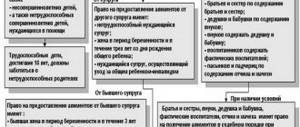As a general rule, in accordance with Art. Spouses have equal rights to own, use and dispose of this property, unless otherwise provided by the Marriage Agreement. That is, while married, each spouse must understand that property acquired during this period becomes common joint property, with the exception of property defined by law as not being part of joint property, which was indicated in Part 1 of this article. But there are situations when the spouses, although they are married, but the actual marital relationship has been terminated, that is, the marriage is of a formal nature.
How to prove that spouses do not live together and do not maintain a common household?
VIDEO ON THE TOPIC: Reunification of spouses during separation
As a general rule, in accordance with Art. Spouses have equal rights to own, use and dispose of this property, unless otherwise provided by the Marriage Agreement.
That is, while married, each spouse must understand that property acquired during this period becomes common joint property, with the exception of property defined by law as not being part of joint property, which was indicated in Part 1 of this article.
But there are situations when the spouses, although they are married, but the actual marital relationship has been terminated, that is, the marriage is of a formal nature. The period when the parties remain in this state sometimes drags on for years or decades.
Is this always the case? No not always. The legislation provides that if, after the actual termination of family relations and running a common household, the spouses did not acquire property jointly, the court divides only that property that was their common joint property before the termination of the common household. When property prices change, its value is determined based on the prices in effect on the day the court decision is made.
In this situation, the legislator is talking about a situation where the spouses, despite being in a registered marriage, have actually ceased to be so, and their marriage does not correspond to the purposes for which it was created.
Exclusion of property from jointly acquired property is possible if two factors are present:. What is the termination of family relations and common household management?
These concepts may include more than one factor, and in each specific case they are assessed individually depending on the circumstances of the case. First of all, this can be expressed in the separation of spouses.
At the same time, the fact of separation does not always prove the termination of family relations and common household management, since a spouse may live separately due to objective reasons. For example, due to the specifics of their profession, a sailor, an international driver, and other professions. Likewise, living in the same residential premises does not exclude the termination of family relationships and maintaining a common household.
This happens in a situation where the spouses remain living in the same living space, becoming virtually strangers, bearing separate expenses for maintaining the living space, eating separately, etc.
In any case, the court must provide evidence indicating the fact of the separate incurrence of costs for the maintenance of residential premises and the absence of a common budget. Termination of relations between married persons as spouses. The presence of a spouse in a de facto marital relationship with another partner.
It is assumed that the termination of family relationships is a situation when the union of a man and a woman has broken up, the goals for which people get married are no longer pursued by the parties. This may also affect the relationship of the spouse with the children, termination of participation in the upbringing and maintenance of children, and others. Lack of a unified family budget. Separate meals. Termination of participation, including a material nature, in the fulfillment of obligations assumed by spouses, for example, termination of payment for the use of residential premises, under a credit agreement, under loan agreements.
Let's look at examples from practice. The court refused to satisfy the plaintiff's claims for division of living quarters. As established by the court, J. has three adult children from their joint marriage. The spouses did not enter into a prenuptial agreement. In connection with work on the collective farm in the subsequent SPK “R”, the family was provided with an apartment in a house on the street.
Based on the application of I., the specified purchase and sale agreement was registered in the village executive committee. The above was confirmed by the case materials and was not disputed by the parties at the court hearing. In refusing to satisfy the plaintiff's demands, the court proceeded from the fact that he had made demands for recognition of the right to a share in the residential premises and its division as jointly acquired property during the marriage.
At the same time, the parties did not dispute at the court hearing that the spouses had not lived together for more than ten years and did not maintain a common household. After the termination of employment relations at SPK “R” in 2009, the plaintiff left his family and went to another city, where he lived in rented apartments and dormitories. Currently he continues to live in another city. In fact, he does not maintain any relationship with his family. At the court hearing, the plaintiff did not dispute that since a year he had not lived together with the defendant and did not have a common household with her.
He confirmed the above in the cassation court. Given such data, taking into account that at the time of acquisition of the disputed apartment the parties did not live together and did not maintain a common household, despite the fact that they were in a registered marriage, the court’s conclusion is correct that this apartment is not the common joint property of the spouses and the division under rules of Art. Court decisions on divorce often indicate the moment of termination of family relationships and running a common household.
However, this circumstance does not always guarantee the possibility of excluding property from jointly acquired property. The court's decision rejected A's claims. The court found that the parties had been married for years. The court's decision on divorce stated that the parties stopped running a common household more than 5 years ago, that is, approximately 18 years ago.
The plaintiff asked to exclude the property from the joint property due to the fact that the property was acquired during the period when the spouses stopped running a common household. The court rejected the claims. The court motivated the refusal to satisfy the demands as follows. An indication in a court decision on the dissolution of a marriage about the termination of a joint household by the spouses is not a prejudicial fact, since the moment of termination of a common household is not among the facts to be proven in the framework of a divorce case and must be proven separately.
All of these situations, as well as many others, can be prevented and legal disputes avoided if the spouses strive to streamline property rights by concluding a marriage contract or promptly transform their actual relations into legal ones.
Komissarova Olga Petrovna. Council of the Minsk Regional Bar Association Legal consultations Specialized legal consultations Lawyers practicing law individually Law offices.
Advocacy. How to become a lawyer Independence of the profession Legal principles of activity Register of lawyers. Free legal assistance Types of legal assistance About fees. Civil law and civil procedure Housing law Inheritance law Family law Labor law Corporate law Criminal law and criminal procedure Administrative law and administrative process Tax law Economic activity Lawyering Land law Enforcement proceedings.
Electronic appeals. Exclusion of property from jointly acquired property, part 2 As a general rule, in accordance with Art. Home Family law Exclusion of property from jointly acquired property, part 2. Official Internet portal of the President of the Republic of Belarus. National legal Internet portal of the Republic of Belarus. Internet portal of the Council of Ministers of the Republic of Belarus. Official website of the Ministry of Justice of the Republic of Belarus.
All rights reserved.
The cohabitation of a man and a woman, defined as a civil marriage, is in fact not such - the concept of cohabitation is more applicable to such a situation. If two citizens manage a household together for a certain time and acquire material assets, certain property can be considered common. If for some reason citizens decide to live separately, the question arises of who will subsequently act as the full owner of what was acquired from the moment the relationship began.
Students who successfully complete the program are issued certificates of the established form. Students who successfully complete the program are issued certificates of the established form. Document review. Togliatti, Samara region, September 3
Is it possible to prove the fact of residence?
Proceedings take place through the court, where the interested party has the right to appeal.
The reasons are different:
- division of jointly acquired property;
- protecting the interests of the common child;
- fulfillment of financial obligations.
Fathers must recognize children born in GB separately, confirming their status in the registry office. Many refuse to do this, and mothers, on the contrary, benefit from the “single mother” status, which implies financial support from the state. When separating, when the former cohabitant does not want to be responsible for the common child, the mother must prove the fact of relationship through the court. DNA analysis will help. True, the plaintiff needs to pay for it, i.e. woman. However, if the result is positive, the invoice can be presented to the defendant. Along with the requirement to pay alimony.
Sharing household appliances and other items is more difficult. However, their cost is also low. “Spoons and forks” ordinary pairs will be divided in half. Everyone first takes the things acquired before the union. Then they look at the belongings. It is unlikely that a man will want to take a woman’s bag, or a woman – a tie. If there is no trust in the family, it is better to keep receipts when making purchases. It shows the cost of things and the date of their purchase. It is better to pay by card, which will simplify the proof of financial investments for citizens.
Loans, debts. It happens that a man first persuades his girlfriend to take on a loan, promising to repay it together. The partner subsequently disappears, leaving the woman alone with her debt. The opposite situations also happen. Girls “spin” mature men with money, asking for expensive gifts. Then they disappear. It is better to apply for joint loans, indicating the details of both. Then, upon separation, everyone will be left with their share of the financial obligations.
Violations of the law. When one partner is a suspect or witness to a crime, the other partner will definitely be interrogated. The police will investigate the extent of his participation and interest. The legal spouse has the right to refuse to give any testimony.
It is possible to prove the existence of a civil marriage. The task can be simplified by the actions of partners during their relationship. And the duration of the union.
What documents confirm the fact that spouses live together and what form should they be?
Judicial practice of lawyer Bazhanov On the division of property acquired after the actual termination of family relations and the maintenance of the spouse’s common household. With a claim for recognition of his ownership of a garage acquired by him in the city, the Court pointed out that Citizen A had not proven that the disputed property was acquired during a period when the spouses did not conduct a joint household, did not maintain marital relations and at the expense of their own funds of Citizen A. In addition, the court referred to the fact that the division of property by the parties in the case was not carried out.
Family Law Lawyer
Separation in itself does not entail recognition of property as personal property. For example, a spouse is on shift, on a long business trip, or lives in different cities for an objective reason (they need to develop “northern” experience,” etc.) and maintain family relationships. This is not a basis for applying paragraph 4 of Art. 38 of the Family Code of the Russian Federation.
In this article from the “Encyclopedia of Complex Cases in the Division of Property,” you can learn about the significance of the moment of termination of cohabitation and family relationships for the division of common property and how you can use this knowledge to your advantage.
How to prove that there is no joint farming
My brother bought a one-room apartment, then got married, had children, and the family decided to expand. Now the couple is getting divorced. Question about the house: whose is it? Is it considered jointly acquired property if it was actually purchased with the brother’s personal money?
Students who successfully complete the program are issued certificates of the established form. Students who successfully complete the program are issued certificates of the established form.
Plaintiff S. filed a claim with the Presnensky District Court of Moscow. In support of her claims, the plaintiff refers to the fact that on October 19, Since this time, the parties have not maintained a common household. During the marriage, disputed property was acquired, which, after the termination of family relations, running a common household - since May, Defendant Art. The defendant does not dispute that he has not lived with the plaintiff and their child since May. It does not dispute that during the period the disputed property was acquired, which was alienated and spent on the dates specified by the plaintiff.
Common household in de facto marriage
Any evidence would be helpful. This includes the testimony of the parties (participants in the trial) and the confession of the defendant, if he is present in the case. And witness statements. As well as written documents.
“Civil Procedure Code of the Russian Federation” dated November 14, 2002 N 138-FZ (as amended on December 19, 2016) (as amended and supplemented, entered into force on January 1, 2017)
▪ Evidence in the case is information obtained in the manner prescribed by law about the facts, on the basis of which the court establishes the presence or absence of circumstances justifying the demands and objections of the parties, as well as other circumstances that are important for the correct consideration and resolution of the case.
▪ Evidence in the case is information obtained in the manner prescribed by law about the facts, on the basis of which the court establishes the presence or absence of circumstances justifying the demands and objections of the parties, as well as other circumstances that are important for the correct consideration and resolution of the case.
This information can be obtained from explanations of the parties and third parties, testimony of witnesses, written and material evidence, audio and video recordings, and expert opinions.








